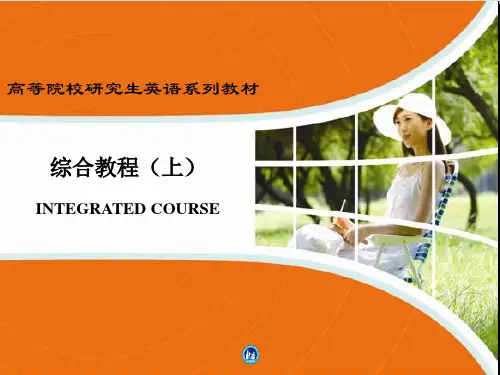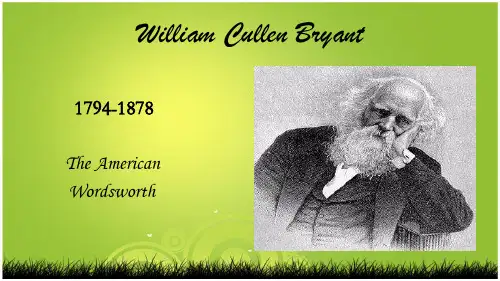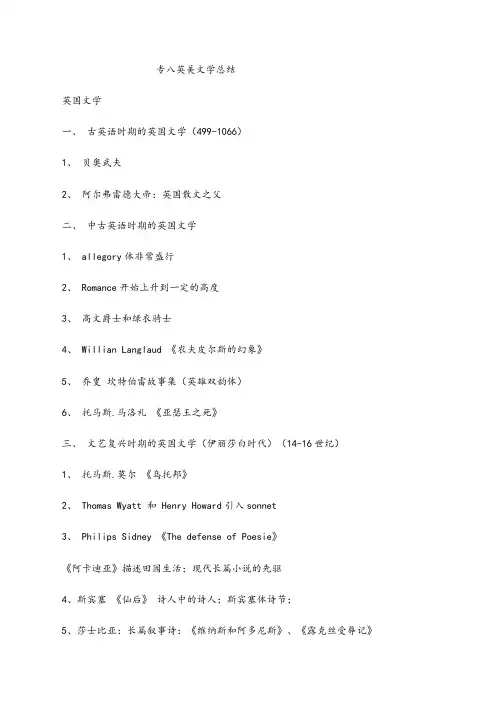Why a classic is a classic (Arnold Bennet)
研究生英语综合教程(上)Unit_3答案

Starting out
Brief Encounter (1945): glamorous Nothing gets more _____________ than that. No, this is no category script, David Lynn’s direction. It is a masterpiece of holding back and I think since it was made ____________, it was all about during WWII sacrifice ____________ and keeping things together and it’s just brimming with the ____________ and the unexpressed unacted-upon. __________ love is the best kind. Tortured
Starting out—Task 2 out—
Task 2
Match the classic line with its corresponding movie. (P64) Key: 1) E 4) F
2) C 5) B
3) A 6) D
Starting out—Task 2 out—
Task 2
Interpretation: One can derive the true meaning of life from pleasure and happiness. But what makes a person who he is depends on how he spends his leisure time.
Starting out
1.To_a_Waterfowl 致水鸟

William Cullen Bryant
1794-1878 The American Wordsworth
To a Waterfowl
• “ The most perfect brief poem in the language” ,called by Matthew Arnold. • “America's first flawless poem”, described by Richard Wilbur.
To a Waterfowl By William Cullen Bryant
• Whither, 'midst falling dew, While glow the heavens with the last steps of day, Far, through their rosy depths, dost thou pursue Thy solitary way? Vainly the fowler's eye Might mark thy distant flight to do thee wrong, As, darkly painted on the crimson sky, Thy figure floats along. Seek'st thou the plashy brink Of weedy lake, or marge of river wide, Or where the rocking billows rise and sink On the chafed ocean side? There is a Power whose care Teaches thy way along that pathless coast,-The desert and illimitable air,-Lone wandering, but not lost.
Why a classic is a classic (Arnold Bennet)学习资料

W h y a c l a s s i c i s a c l a s s i c(A r n o l dB e n n e t)Why a Classic Is a Classicby Arnold BennettThe large majority of our fellow-citizens care as much about literature as they care about aeroplanes or the programme of the Legislature. They do not ignore it; they are not quite indifferent to it. But their interest in it is faint and perfunctory; or, if their interest happens to be violent, it is spasmodic. Ask the two hundred thousand persons whose enthusiasm made the vogue of a popular novel ten years ago what they think of that novel now, and you will gather that they have utterly forgotten it, and that they would no more dream of reading it again than of reading Bishop Stubbs’s Select Charters. Probably if they did read it again they would not enjoy it—not because the said novel is a whit worse now than it was ten years ago; not because their taste has improved—but because they have not had sufficient practice to be able to rely on their taste as a means of permanent pleasure. They simply don’t know from on e day to the next what will please them.In the face of this one may ask: Why does the great and universal fame of classical authors continue? The answer is that the fame of classical authors is entirely independent of the majority. Do you suppose that if the fame of Shakespeare depended on the man in the street it would survive a fortnight? The fame of classical authors is originally made, and it is maintained, by a passionate few. Even when a first-class author has enjoyed immense success during his lifetime, the majority have never appreciated him so sincerely as they have appreciated second-rate men. He has always been reinforced by the ardour of the passionate few. And in the case of an author who has emerged into glory after his death the happy sequel has been due solely to the obstinate perseverance of the few. They could not leave him alone; they would not. They kept on savouring him, and talking about him, and buying him, and they generally behaved with such eager zeal, and they were so authoritative and sure of themselves, that at last the majority grew accustomed to the sound of his name and placidly agreed to the proposition that he was a genius; the majority really did not care very much either way.And it is by the passionate few that the renown of genius is kept alive from one generation to another. These few are always at work. They are always rediscovering genius. Their curiosity and enthusiasm are exhaustless, so that there is little chance of genius being ignored. And, moreover, they are always working either for or against the verdicts of the majority. The majority can make a reputation, but it is too careless to maintain it. If, by accident, the passionate few agree with the majority in a particular instance, they will frequently remind the majority that such and such a reputation has been made, and the majority will idly concur: “Ah, yes. By the way, wemust not forget that such and such a reputation exists.” Without that persistent memory-jogging the reputation would quickly fall into the oblivion which is death. The passionate few only have their way by reason of the fact that they are genuinely interested in literature, that literature matters to them. They conquer by their obstinacy alone, by their eternal repetition of the same statements. Do you suppose they could prove to the man in the street that Shakespeare was a great artist? The said man would not even understand the terms they employed. But when he is told ten thousand times, and generation after generation, that Shakespeare was a great artist, the said man believes—not by reason, but by faith. And he too repeats that Shakespeare was a great artist, and he buys the complete works of Shakespeare and puts them on his shelves, and he goes to see the marvellous stage-effects which accompany King Lear or Hamlet, and comes back religiously convinced that Shakespeare was a greatartist. All because the passionate few could not keep their admiration of Shakespeare to themselves. This is not cynicism; but truth. And it is important that those who wish to form their literary taste should grasp it.What causes the passionate few to make such a fuss about literature? There can be only one reply. They find a keen and lasting pleasure in literature. They enjoy literature as some men enjoy beer. The recurrence of this pleasure naturally keeps their interest in literature very much alive. They are for ever making new researches, for ever practising on themselves. They learn to understand themselves. They learn to know what they want. Their taste becomes surer and surer as their experience lengthens. They do not enjoy to-day what will seem tedious to them to-morrow. When they find a book tedious, no amount of popular clatter will persuade them that it is pleasurable; and when they find it pleasurable no chill silence of the street-crowds will affect their conviction that the book is good and permanent. They have faith in themselves. What are the qualities in a book which give keen and lasting pleasure to the passionate few? This is a question so difficult that it has never yet been completely answered. You may talk lightly about truth, insight, knowledge, wisdom, humour, and beauty. But these comfortable words do not really carry you very far, for each of them has to be defined, especially the first and last. It is all very well for Keats in his airy manner to assert that beauty is truth, truth beauty, and that that is all he knows or needs to know. I, for one, need to know a lot more. And I never shall know. Nobody, not even Hazlitt nor Sainte-Beuve, has ever finally explained why he thought a book beautiful. I take the first fine lines that come to hand—The woods of Arcady are dead,And over is their antique joy—and I say that those lines are beautiful, because they give me pleasure. But why? No answer! I only know that the passionate few will, broadly, agree with me in deriving this mysterious pleasure from those lines. I am only convinced that the liveliness of our pleasure in those and many other lines by the same author will ultimately cause the majority to believe, by faith, that W.B. Yeats is a genius. The one reassuringaspect of the literary affair is that the passionate few are passionate about the same things. A continuance of interest does, in actual practice, lead ultimately to the same judgments. There is only the difference in width of interest. Some of the passionate few lack catholicity, or, rather, the whole of their interest is confined to one narrow channel; they have none left over. These men help specially to vitalise the reputations of the narrower geniuses: such as Crashaw. But their active predilections never contradict the general verdict of the passionate few; rather they reinforce it.A classic is a work which gives pleasure to the minority which is intensely and permanently interested in literature. It lives on because the minority, eager to renew the sensation of pleasure, is eternally curious and is therefore engaged in an eternal process of rediscovery. A classic does not survive for any ethical reason. It does not survive because it conforms to certain canons, or because neglect would not kill it. It survives because it is a source of pleasure, and because the passionate few can no more neglect it than a bee can neglect a flower. The passionate few do not read “the right things” because they are right. That is to put the cart before the horse. “The right things” are the right things solely because the passionate few like reading them. Hence—and I now arrive at my point—the one primary essential to literary taste is a hot interest in literature. If you have that, all the rest will come. It matters nothing that at present you fail to find pleasure in certain classics. The driving impulse of your interest will force you to acquire experience, and experience will teach you the use of the means of pleasure. You do not know the secret ways of yourself: that is all. A continuance of interest must inevitably bring you to the keenest joys. But, of course, experience may be acquired judiciously or injudiciously, just as Putney may be reached via Walham Green or via St. Petersburg.。
英美文学总结

专八英美文学总结英国文学一、古英语时期的英国文学(499-1066)1、贝奥武夫2、阿尔弗雷德大帝:英国散文之父二、中古英语时期的英国文学1、allegory体非常盛行2、Romance开始上升到一定的高度3、高文爵士和绿衣骑士4、Willian Langlaud 《农夫皮尔斯的幻象》5、乔叟坎特伯雷故事集(英雄双韵体)6、托马斯.马洛礼《亚瑟王之死》三、文艺复兴时期的英国文学(伊丽莎白时代)(14-16世纪)1、托马斯.莫尔《乌托邦》2、Thomas Wyatt 和Henry Howard引入sonnet3、Philips Sidney 《The defense of Poesie》《阿卡迪亚》描述田园生活;现代长篇小说的先驱4、斯宾塞《仙后》诗人中的诗人;斯宾塞体诗节;5、莎士比亚:长篇叙事诗:《维纳斯和阿多尼斯》、《露克丝受辱记》四大悲剧:哈姆雷特、李尔王、奥赛罗、麦克白7、本.琼森风俗喜剧(comedy of manners)《人性互异》8、约翰.多恩“玄学派”诗歌创始人9、George Herbert 玄学派诗圣10、弗朗西斯.培根现代科学和唯物主义哲学创始人之一《Essays》英国发展史上的里程碑《学术的推进》和《新工具》四、启蒙时期(18世纪)1、约翰、弥尔顿:《失乐园》、《为英国人民争辩》2、约翰、班扬:《天路历程》religious allegory3、约翰、德莱顿:英国新古典主义的杰出代表、桂冠诗人;《论戏剧诗》4、亚历山大.蒲柏:英国新古典主义诗歌的重要代表;英雄双韵体的使用达到登峰造极的使用;《田园组诗》是其最早田园诗歌代表作5、托马斯、格雷:感伤主义中墓园诗派的代表人物《墓园挽歌》6、威廉、布莱克:天真之歌、经验之歌;7、罗伯特、彭斯:苏格兰最杰出的农民诗人;8、Richard Steel和Joseph Addison合作创办《The tatler》和《the spectator》9、Samuel defoe 英国现实主义小说的奠基人之一;《鲁滨逊漂流记》;《铲除非国教徒的捷径》,仪表达自己的不满;10、Jonathan Swift 《一个小小的建议》;《格列佛游记》;《桶的故事》;11、Samuel Richardson 英国现代小说的创始人;帕米拉;克拉丽莎;查尔斯.格蓝迪森爵士的历史;12、Henry Fielding 英国现实主义小说理论的奠基人;《约瑟夫。
我们当时相爱而实在无知:英国诗选(英汉对照)

04
约翰·米尔 顿 (1608— 1674)
06
约翰·萨克 令 (1609— 1642)
05
JOHN SUCKLING (1609– 1642)
ANDREW MARVELL (1621–1678)
安德鲁·玛弗尔 (1621—1678)
JOHN DRYDEN (1631–1700)
约翰·德莱顿 (1631—1700)
2
BLAKE
(1757–1827)
3
威廉·布雷克 (1757—1827)
4 ROBERT
BURNS (1759–1796)
5 罗伯特·布恩
士 (1759— 1796)
ALEXANDER POPE (1688–1744)
Hampton Court
亚力山大·蒲伯 (1688—1744)
海姆普敦宫1 Timon s Villa 泰门的庄园1
但特·盖布里哀 尔·罗瑟提
(1828—1882)
克丽思绨娜·罗瑟 提 (1830—1894)
01
ALGERNON CHARLES SWINBURN E (1837– 1909)
02
阿尔及 南·查 理·斯温本 (1837— 1909)
03
THOMAS HARDY (1840– 1928)
04
托麦斯·哈 代 (1840— 1928)
GEORGE GORDON BYRON (1788–1824)
“When we two parted”
乔治·戈顿·拜伦 (1788—1824)
“想当年我们俩分手”1 The Eve of Waterloo 滑铁卢前夜1 The Isles of Greece 哀希腊1 Business in Heaven 天上的公务1
英语人名

Beerbohm 比尔博姆
Bell 贝尔
Bellamy 贝拉米
Belle 贝尔(Arabella的昵称)
Belloc 贝洛克
Ben 本(Benjamin的昵称)
Benedict 本尼迪克特
Chesterton 切斯特顿
Child 蔡尔德
Childe 蔡尔德
Christ 克赖斯特
Christian 克里琴斯
Christiana 克里斯蒂安娜
Christie 克里斯蒂(Christian的昵称)
3. 在姓名之前有时还要有人际称谓,如职务军衔之类。Dr., Prof., Pres. 可以用于姓氏前或姓名前;而Sir 仅用于教名或姓名前。
To the top(回页首)
常见的英文人名
Abbot(t) 阿博特
Abe 阿贝(Abraham的昵称)
女子名为:Jane, Mary, Elizabeth, Ann, Sarah, Catherine.
II. 昵称
昵称包括爱称、略称和小名,是英语民族亲朋好友间常来表示亲切的称呼,是在教名的基础上派生出来的。通常有如下情况:
1. 保留首音节。如 Donald => Don, Timothy => Tim. 如果本名以元音开头,
Clare 克莱尔(ClaraClarissa的昵称)
Mac-, Fitz- 等均表示某某之子或后代。
3. 在教名前附加表示身份的词缀,如 St.-, De-, Du=, La-, Le-.
4. 放映地名,地貌或环境特征的,如 Brook, Hill等。
5. 放映身份或职业的,如:Carter, Smith.
研究生英语综合教程(上)Unit_3答案
Starting out—Task 1 out—
5. Those who decide to use leisure as a means of mental development, who love good music, good books, good pictures, good company, good conversation, are the happiest people in the world. And they are not only happy in themselves, they are the cause of happiness in others. —William Lyon Phelps American educator
Starting out
Task 1 Work in groups to interpret and comment on the quotations about leisure on Page 64.
Starting out—Task 1 out—
1. To be able to fill leisure intelligently is the last product of civilization. —Arnold Toynbee
Starting out
Truly Madly Deeply: Because she loves him so much that Alan Rickman comes back to Juliet Stevenson. She’s just one of the great _____________ of all time. One of the things I crying scenes love about this is in pairing these two together is that his ghost friends in fact Alan Rickman and _______________ sit around watching Brief Encounter on television—perfect little connection. It’s just wonderful and in fact she does learn to ____________ move on find a new lovely man and ____________________ in her life who is living.
成功者必看十大励志电影美剧电影
成功者必看十大励志电影美剧电影成功不是一天能取得的,成功需具备的心理素质。
成功者在奋斗的路上少不了励志的心态,小编整理了一些成功者必看的励志电影,希望你喜欢。
十大成功者必看励志电影成功者必看十大励志电影1:《奔腾年代》(Seabiscuit)感悟:一个不甘寂寞的商人,从自行车配件维修:到销售汽车:再到经营马匹,本身他就是一个创业者奋斗的缩影:一个努力不息的英雄,自身的经历成为他演讲有力的支持与鼓励。
成功者必看十大励志电影2:《阿甘正传》(Forrest Gump)感悟:在踏上这个充满竞争与排挤的社会之前,《阿甘正传》教给你处世方的不是与世无争:息事宁人,而是为目标默默奋斗:乐天知命。
看了《阿甘正传》,创业者内心能多一份平静,少一份浮躁,就已经很宝贵了。
成功者必看十大励志电影3:《百万美元宝贝》(Million Dollar Baby)感悟:正如导演伊斯特伍德所说的,"这不是一个关于拳击的故事,是关于希望:梦想和爱的故事",创业者能从中认识到,金钱不是最重要的,希望+梦想+爱才是我们持之以恒奋斗的原因。
成功者必看十大励志电影4:《毕业生》(The Graduate)感悟:达斯汀.霍夫曼对未知世界的彷徨和向往,以及那个洋溢着激情和冲动的结尾,都一丝不差地契合了毕业生的心情。
从毕业生走上创业之路,正是摆脱彷徨,挥发激情的康庄大道。
成功者必看十大励志电影5:《当幸福来敲门》(The Pursuit of Happyness)感悟:你刚刚拿到大学文凭,雄心勃勃,希望在事业上大展身手,可是找工作的过程渐渐泯灭了你的雄心,四处碰壁后该怎么办?这时候,看这部片子,总能自我安慰一下:再怎么样,我也比主角幸运!至少我在创业,命运掌握在自己手中!成功者必看十大励志电影6:《律政俏佳人》(Legally Blonde)感悟:这不仅是一部给美国年轻一代尤其是年轻女性的励志电影,更象是一部告诉年轻女性们该如何去维护自己的权利的影片。
Arnold 马修·阿诺德
Matthew Arnold (1822-1888)The Heterological Thinkers•an autological word is a word expressing a property which it also possesses itselfe.g. the word "short" is short, "noun" is a noun, "English" is English•a heterological word is a word that does not apply to itselfe.g. "long" is not long, "verb" is not a verbThe Heterological Thinkers main concerns•challenged the very discipline of philosophy and its claims to arrive at truth through reason•emphasize instead of the role of emotion, the body, sexuality, the unconscious, as well as of pragmatic interests•deplore the effect of French RevolutionMatthew Arnold•British poet, cultural critic, educator •one of the founding figures of modern English criticism•appointed Professor of Poetry at Oxford in 1857•Literary Careerpoetry 1850s"Dover Beach"literary and social criticism 1860s "Essays in Critism" "Culture and Anarchy" on religious and esucational matters 1870sThe Function of Criticism •concern to counteract the philistinism of the world as defined by the English bourgeoisie with the imperatives of the immediate present.•redefine the central responsibilities of criticism (original & controversial)•creative power•the work of literary genius —"synthesis and exposition"•aim of literary work•task of criticismMajor Points•"the creation of a modern poet…implies a great critical effort behind it"•French Revolution—"took a political, practical character"—evaluation positivenegative—influenceIt creats an epoch of reaction or opposition against itselfMajor Points Disinterestedness (超然)•How is criticism to be disinterested?—by keeping aloof from the practical view of things —by following the law of its own nature—by steadily refusing to lend itself to any of those ulterior, political, practical considerations about ideals—by attempting to know the best that is known and thought in the world, and by in turn making this known, to creat a current of true and fresh ideas—by being independent of all interestsDisinterestedness•purpose:to lead man towards perfection •Criticism should embrace the Indian virtue of detachment, the Hindu ideal of ascetic (禁欲主义)renunciation(克己)of all worldly concerns.—contrast between the mass of peoplepracticalthe critic•Importance—without such a disinterested perspective truth and the highest culture will not be possible—if a critic can truely porform this, he will move beyond insularity•Every critic should try to master at least one literature in a language other than its own•Culture and Anarchy(1869)—both redefine "culture" and affirms the need for it in a modern industrial society devoted to mechanism and profit.—culture is a study of perfection which has an intellectual and an ethical componentculture•aims of culture and religion (similarities)—aim—the cultivation of inwardness—expands our gifts of thought and feeling, and fosters growth in wisdom and beauty —require the individual to be part of a general movement toward perfectionculture advances beyond natureculture•function of culture—to purge our minds of the effects of material and narrow preoccupations —to stem the common tide of men's thoughts in a wealthy and industrial communityculture shares the same spirt as poetrypoetry will replace the function of religion•Task of both criticism and culture—to place the pragmatic bourgeois vision of life in a broader historical and international text•purpose of criticism—political—an instrument which might lift us beyond an immediate present governed by the narrow principles of utility, material progress, and the dictation of all theory by the exigencies of practice.summary—the bourgeois thought concentrates on the "outward", so Arnold emphasizes more on the human being's "inward" capabilities. —Arnold's key notions of criticism, culture, and poetry are all modes of "inwardness", aimed to counteract the "externality" of the bourgeois worldThe Study of Poetry (1880)•Arnold's world view—deeply humanist—writes in the tradition of a humanism •Arnold's text is the most influential text ofliterary humanism—it insists on the social and culturalfunctions of literature—its ability to civilize and to cultivatemorality—it provides a bulwark against themechanistic excesses of modern civilization•religion —threaten by science andideology of the "fact"•philosophy —powerless•poetry —spiritual and emotional support —interpret life—a criticism of lifePoetry's high function is actually to replace religion and philosophy•notions of the classic and tradition—we need to be sure that our estimate of poetry is "real" rather than historical or personal—an author was important for the development of language or certain literary traditions without having himself composed a classic•How do we arrive at this real estimate of what constitutes a classic?—a theroy or the practice of using touchstones •defects—lack of engagement with formal qualities —lack any sense of engagement in historical。
英国文学概论
An Introduction to British Literature (英国文学概论)
English Romanticism (1798-1832)
From William Wordsworth and Samuel T. Coleridge ‘s Lyric Ballads to Sir. W. Scott’s death. The major differences from Neo-classical: to stress on man’s personal feelings and individualities ; to stress on imagination and emotions; to gain inspirations from folktales and fairy stories; to stress on individual values rather than the collective values. Three Periods: The pre-romanticism William Blake (1757-1827)and Robert Burns(17591796) The Early Romanticism: W. Wordsworth, Coleridge The Late Romanticism : P.B. Shelley (1792-1822), Lord Byron (17881824)John Keats (1795-1821)
Emily Bronte(1818-1848 ) Wuthering Heights Anne Bronte (1820-1849) Agnes grey George Eliot (1819-1880) Mary Ann Evans: The Mill on the Floss, Middlemarch William M Thackeray (1811-1863) Vanity Fair Samuel Butler(1835-1902) The Way of All Life
- 1、下载文档前请自行甄别文档内容的完整性,平台不提供额外的编辑、内容补充、找答案等附加服务。
- 2、"仅部分预览"的文档,不可在线预览部分如存在完整性等问题,可反馈申请退款(可完整预览的文档不适用该条件!)。
- 3、如文档侵犯您的权益,请联系客服反馈,我们会尽快为您处理(人工客服工作时间:9:00-18:30)。
Why a Classic Is a Classicby Arnold BennettThe large majority of our fellow-citizens care as much about literature as they care about aeroplanes or the programme of the Legislature. They do not ignore it; they are not quite indifferent to it. But their interest in it is faint and perfunctory; or, if their interest happens to be violent, it is spasmodic. Ask the two hundred thousand persons whose enthusiasm made the vogue of a popular novel ten years ago what they think of that novel now, and you will gather that they have utterly forgotten it, and that they would no more dream of reading it again than of reading Bishop Stubbs’s Select Charters. Probably if they did read it again they would not enjoy it—not because the said novel is a whit worse now than it was ten years ago; not because their taste has improved—but because they have not had sufficient practice to be able to rely on their taste as a means of permanent pleasure. They simply don’t know from one day to the next what will please them.In the face of this one may ask: Why does the great and universal fame of classical authors continue? The answer is that the fame of classical authors is entirely independent of the majority. Do you suppose that if the fame of Shakespeare depended on the man in the street it would survive a fortnight? The fame of classical authors is originally made, and it is maintained, by a passionate few. Even when a first-class author has enjoyed immense success during his lifetime, the majority have never appreciated him so sincerely as they have appreciated second-rate men. He has always been reinforced by the ardour of the passionate few. And in the case of an author who has emerged into glory after his death the happy sequel has been due solely to the obstinate perseverance of the few. They could not leave him alone; they would not. They kept on savouring him, and talking about him, and buying him, and they generally behaved with such eager zeal, and they were so authoritative and sure of themselves, that at last the majority grew accustomed to the sound of his name and placidly agreed to the proposition that he was a genius; the majority really did not care very much either way.And it is by the passionate few that the renown of genius is kept alive from one generation to another. These few are always at work. They are always rediscovering genius. Their curiosity and enthusiasm are exhaustless, so that there is little chance of genius being ignored. And, moreover, they are always working either for or against the verdicts of the majority. The majority can make a reputation, but it is too careless to maintain it. If, by accident, the passionate few agree with the majority in a particular instance, they will frequently remind the majority that such and such a reputation has be en made, and the majority will idly concur: “Ah, yes. By the way, we must not forget that such and such a reputation exists.” Without that persistent memory-jogging the reputation would quickly fall into the oblivion which is death. The passionate few only have their way by reason of the fact that they are genuinely interested in literature, that literature matters to them. They conquer by their obstinacy alone, by their eternal repetition of the same statements. Do you suppose they could prove to the man in the street that Shakespeare was a great artist? The said man would not even understand the terms they employed. But when he is told ten thousand times,and generation after generation, that Shakespeare was a great artist, the said man believes—not by reason, but by faith. And he too repeats that Shakespeare was a great artist, and he buys the complete works of Shakespeare and puts them on his shelves, and he goes to see the marvellous stage-effects which accompany King Lear or Hamlet, and comes back religiously convinced that Shakespeare was a great artist. All because the passionate few could not keep their admiration of Shakespeare to themselves. This is not cynicism; but truth. And it is important that those who wish to form their literary taste should grasp it.What causes the passionate few to make such a fuss about literature? There can be only one reply. They find a keen and lasting pleasure in literature. They enjoy literature as some men enjoy beer. The recurrence of this pleasure naturally keeps their interest in literature very much alive. They are for ever making new researches, for ever practising on themselves. They learn to understand themselves. They learn to know what they want. Their taste becomes surer and surer as their experience lengthens. They do not enjoy to-day what will seem tedious to them to-morrow. When they find a book tedious, no amount of popular clatter will persuade them that it is pleasurable; and when they find it pleasurable no chill silence of the street-crowds will affect their conviction that the book is good and permanent. They have faith in themselves. What are the qualities in a book which give keen and lasting pleasure to the passionate few? This is a question so difficult that it has never yet been completely answered. You may talk lightly about truth, insight, knowledge, wisdom, humour, and beauty. But these comfortable words do not really carry you very far, for each of them has to be defined, especially the first and last. It is all very well for Keats in his airy manner to assert that beauty is truth, truth beauty, and that that is all he knows or needs to know. I, for one, need to know a lot more. And I never shall know. Nobody, not even Hazlitt nor Sainte-Beuve, has ever finally explained why he thought a book beautiful. I take the first fine lines that come to hand—The woods of Arcady are dead,And over is their antique joy—and I say that those lines are beautiful, because they give me pleasure. But why? No answer! I only know that the passionate few will, broadly, agree with me in deriving this mysterious pleasure from those lines. I am only convinced that the liveliness of our pleasure in those and many other lines by the same author will ultimately cause the majority to believe, by faith, that W.B. Yeats is a genius. The one reassuring aspect of the literary affair is that the passionate few are passionate about the same things. A continuance of interest does, in actual practice, lead ultimately to the same judgments. There is only the difference in width of interest. Some of the passionate few lack catholicity, or, rather, the whole of their interest is confined to one narrow channel; they have none left over. These men help specially to vitalise the reputations of the narrower geniuses: such as Crashaw. But their active predilections never contradict the general verdict of the passionate few; rather they reinforce it.A classic is a work which gives pleasure to the minority which is intensely and permanently interested in literature. It lives on because the minority, eager to renew the sensation of pleasure, is eternally curious and is therefore engaged in an eternal process of rediscovery. A classic does not survive for any ethical reason. It does not survive because it conforms to certain canons, orbecause neglect would not kill it. It survives because it is a source of pleasure, and because the passionate few can no more neglect it than a bee can neglect a flower. The passionate few do not read “the right things” because they are right. That is to put the cart before the horse. “The right things” are the right things solely because the passionate few like reading them. Hence—and I now arrive at my point—the one primary essential to literary taste is a hot interest in literature. If you have that, all the rest will come. It matters nothing that at present you fail to find pleasure in certain classics. The driving impulse of your interest will force you to acquire experience, and experience will teach you the use of the means of pleasure. You do not know the secret ways of yourself: that is all. A continuance of interest must inevitably bring you to the keenest joys. But, of course, experience may be acquired judiciously or injudiciously, just as Putney may be reached via Walham Green or via St. Petersburg.。
